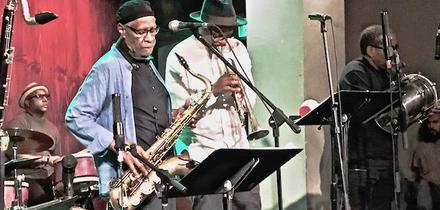This night served as an opportunity to rack a fresh perspective on Maupin's hard-grooving sextet, in operation for a few years now. My high opinion from four months ago hasn't changed, but I learned a few new things about the musicians.
Last time, I crowded the elbow of percussionist Eric McCain; this time, a perch on the opposite side of the stage offered a view over the shoulder of keyboardist David Arnay. Always wearing half a smile, Arnay impressed with the intelligent precision of his interjections on acoustic piano, and the way his sustains on synthesizer provided a harmonic and coloristic background that made the other instruments pop out. Just as impressive was what the guy didn't play: When the sonic canvas was full, he just lifted his fingers. And listened.
McCain's role, complementary to Arnay's, showed why Maupin wanted a sextet. Where a quartet format can encourage formulaic trade-offs among sax, trumpet and other solos, McCain was soloing almost all of the time on many kinds of shakers, bells, hand drums and whatever, supporting the group sound with ever-changing counterrhythms and tonalities. He kept us engaged, not with an attitude of "Look at me," but "Listen to US."
McCain could do that because of Kenny Sara's upbeat energy on the drums, always in the pocket. And I finally figured out bassist Darek Oles' signature role, in addition to all his other virtues of rhythm and tone: He finds the CENTER of the music and keeps circling around it, so that, however far afield any particular musician might fly, no one can ever lose it.
Maupin made note of the legendary trumpeters he's played with, names like Lee Morgan, Freddie Hubbard and Miles somethingorother. And he welcomed young trumpeter Chris Williams into that circle with full confidence. Williams, in fact, though he uses foot pedals as Miles did in the '70s, doesn't phrase or improvise like Miles, which is hard to avoid. Williams has been known to give a nod to Bill Dixon, a source you can hear in the young man's fearlessness. Maybe there's a touch of Woody Shaw in the way Williams solos with sure melodic sense while frequently choosing unexpected notes. But his electronic acuity and hep personality enhance his individuality, and there's little doubt he will seek out leadership opportunities. Not that he wants to leave Maupin, with whom he shares an obvious affection and rapport.
Maupin treats this sextet as a band -- a band he formed because he just wanted to play with them. From his Ellingtonian solo introduction on tenor to his stylistic journeys through African riffs, funky rhythms and balladic emotion on bass clarinet and soprano sax, he felt more like fulcrum than boss. Or, you might say, the voice of long experience.
* * *
PHOTOS BY FUZZY BARK.

